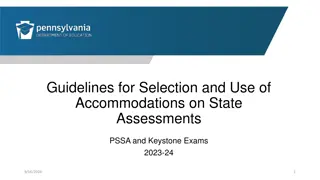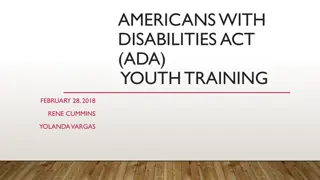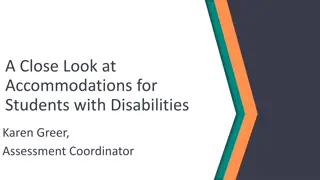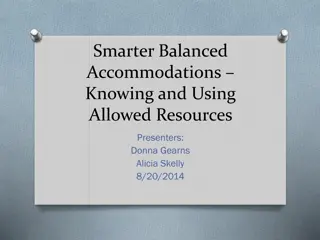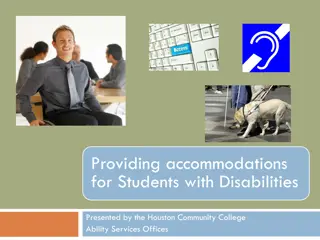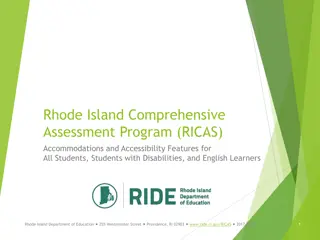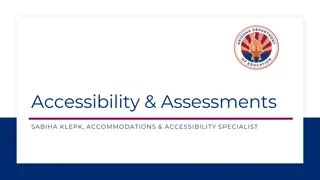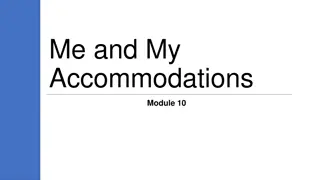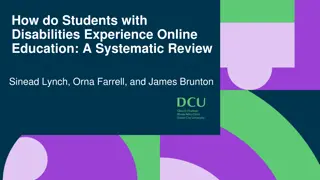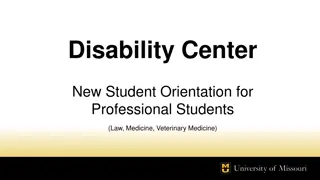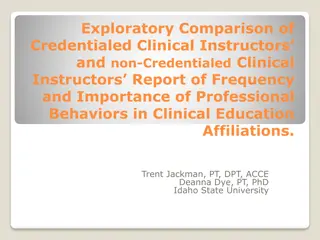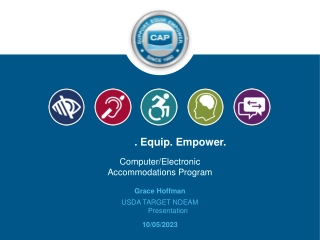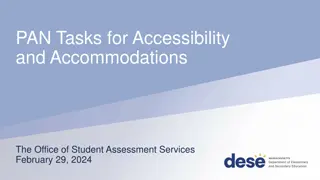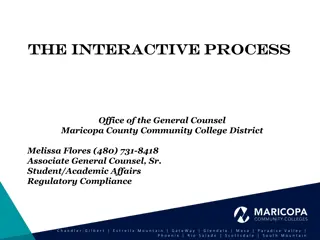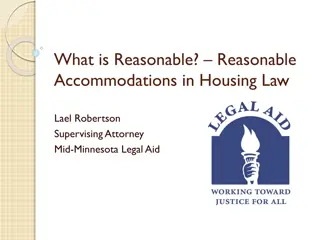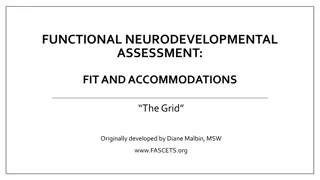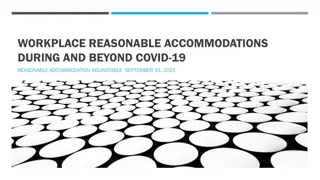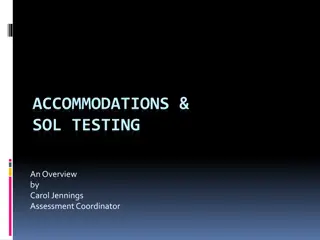Case-Based Review for Clinical Accommodations in Health Science Education
Join us in exploring case studies and decision-making frameworks for determining clinical accommodations in health science education. Engage in problem-based learning scenarios and discussions to identify knowledge gaps, access new information, and address barriers effectively. Learn about approving accommodations while considering technical standards, patient safety, program integrity, and undue burden. This inclusive event promotes equal access and support for students with disabilities in professional education settings.
Download Presentation

Please find below an Image/Link to download the presentation.
The content on the website is provided AS IS for your information and personal use only. It may not be sold, licensed, or shared on other websites without obtaining consent from the author. Download presentation by click this link. If you encounter any issues during the download, it is possible that the publisher has removed the file from their server.
E N D
Presentation Transcript
A Case-based review for Determining Clinical Accommodations Jan Serrantino, Ed.D. President, The Coalition for Disability Access in Health Science Education Consultant, Meeks & Company Consulting Lisa Meeks, PhD Assistant Professor University of Michigan School of Medicine
We ask you to join us in creating a culture that reflects Conference Inclusion Statement Access and Inclusion and Civility and Respect this week and in all aspects of our organization. Please be respectful of your colleagues by silencing your phone. If you need to answer a call, please go to the hallway.
Agenda 1.Case Study Discussions- MPBL 2.Decision Flowchart with 5 Questions 3.Group Discussion of Scenarios 4.Group Deconstruction 5. Q and A
PROBLEM-BASED LEARNING: Scenarios Participants engage with various scenario: IDENTIFY: What do I already know? What do I need to know? How and where can I access new information that may lead to the resolution? How might I address the barriers in this scenario? What other confounders do I need to consider? REPORT OUT
The Guide to Assisting Students With Disabilities: Equal Access in Health Science and Professional Education, p. 45.
1. Would approving accommodations cause a failure to meet any Technical Standards?
2. Would approving the accommodation legitimately jeopardize patient safety?
3. Would approving the accommodation fundamentally alter the program?
4. Would approving the accommodation cause an undue burden?
Nevil Newman Advanced Nursing Student
Basic Facts of the Case Nevil is a first-generation college student whose parents immigrated from Nigeria before he was born. His parents worked full time and he helped raise his brothers and sisters. Nevil received tuition remission as part of his father s employment benefits at the local state college. Nevil was a business major and earned a 3.20 in his basic science courses. While in college, he played varsity basketball and was president of his student body. After graduating, Nevil decided he wanted to make a bigger difference and really help people. He applied to, and was accepted into your three-year accelerated program leading to a Master of Science degree in nursing. Nevil was diagnosed with ADHD right before coming to nursing school. His first noticed symptoms of inattention when trying to study for the GRE. He is not currently being treated for ADHD.
Basic Facts of the Case A rough start, and disclosure of his ADHD to a faculty member, led to a referral to disability services. Nevil registered and receives time and one half on his exams in a reduced distraction location. Nevil passes the first semester of the program (all didactic), however, he required extensive support (weekly learning specialist meetings, disability accommodations, wellness visits, and life coach). Nevil begins his Adult Med-Surgery rotation and his preceptor reports that he is fuzzy with details and misses too much information. The preceptor notes concern about the student, and expresses doubt that the student will be successful. The preceptor also expresses concern for patient safety, stating that the student misses critical patient details in his evaluations.
Basic Facts of the Case Given the stated concerns, the assistant dean of students shares that Nevil has ADHD and notes that it can sometimes be difficult to concentrate and retain information for these students but that he is getting accommodations. The preceptor is shocked and notes that he will not make any clinical accommodations during medsurg stating that someone has to protect the integrity of the program. To mitigate the effects of his ADHD, Nevil is asking for extra time on his standardized patient exams, time and one half when reviewing patient charts and to document patient interactions when on the ward.
PROBLEM-BASED LEARNING: Scenarios As a GROUP IDENTIFY: What do I already know? What do I need to know? How and where can I access new information that may lead to the resolution? How might I address the barriers in this scenario? What other confounders do I need to consider?
1. Would approving accommodations cause a failure to meet any Technical Standards?
2. Would approving the accommodation legitimately jeopardize patient safety?
3. Would approving the accommodation fundamentally alter the program?
4. Would approving the accommodation cause an undue burden?
Rhonda Rapp 4th year Medical Student
Basic Facts of the Case Rhonda Rapp is a force of nature and was on the fast track to stardom when entering medical school. Rhonda scored in the 99th% on the MCAT and had meaningful experiences as a yoga instructor for teens with physical disabilities before coming to medical school. Rhonda s mother passed away when she was 12 from breast cancer prompting her interest in medicine. Rhonda entered medical school as a Chancellor s Scholar, which covered her entire tuition. An instant favorite among her peers, Rhonda initiated pot luck study group and outings each weekend, often organizing long hikes and yoga on the beach. Rhonda felt complete with her med school family and was thriving in medical school. She absorbed the first two years of medical school, and excelled in her clinical rotations, honoring in 5 out of 6 clerkships. During her sub-internship in medicine, Rhonda began to sleep more, experience periods of melancholy, and started losing weight. Her weekly pot-lucks were often cancelled and she was not as responsive to her peers. When asked if everything was ok she replied that she was simply overtaxed with residency applications and interviews. Her performance in the sub-I and her electives began to deteriorate and she found it difficult to focus. At times she broke down crying on the wards with no discernable cause and had to excuse herself for 15-20 minutes before she could return to the team. Rhonda was initially set up to see a therapist, but the competing demands of the sub-I, preparation for Step 2, and applications to residency kept her from seeking care.
Basic Facts of the Case Faculty note that while Rhonda is in efficient on the wards and has a good command of clinical knowledge, she displays emotional liability and seems distant. She is having trouble connecting with the team and with patients. She is also not performing at the level of an intern. Rhonda is referred to the Dean of Students as she is at risk of failing the sub-I due to deficits in communication and concerns regarding professionalism. Her faculty are also worried about her mental state. The Dean of students asks you for advice on how to support Rhonda.
PROBLEM-BASED LEARNING: Scenarios As a GROUP IDENTIFY: What do I already know? What do I need to know? How and where can I access new information that may lead to the resolution? How might I address the barriers in this scenario? What other confounders do I need to consider?
1. Would approving accommodations cause a failure to meet any Technical Standards?
2. Would approving the accommodation legitimately jeopardize patient safety?
3. Would approving the accommodation fundamentally alter the program?
4. Would approving the accommodation cause an undue burden?


